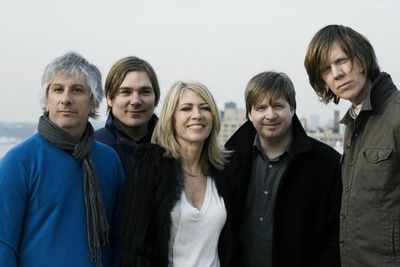Sonic Youth returns to its indie roots

The fact that Sonic Youth spent the last 20 years on a major label – considering its breadth of work – is truly commendable.
But the idea that Sonic Youth was ever on a major label at all is downright laughable.
Here is a band that has dedicated every fiber of its being to anti-pop obscurity. Instead, Sonic Youth’s combination of spoken-word whispers, amplified feedback, unorthodox tunings and guitars played with drumsticks and screwdrivers staged a record industry ambush that helped define the alternative rock movement of the 1990s, blazing a trail for artists such as Nirvana, Beck and Weezer.
For nine albums over the course of 20 years, Sonic Youth made noncompromising avant-garde rock that always defied any sentiment of selling out, despite corporate ties.
And this year, for the first time since 1988’s monumental “Daydream Nation,” Sonic Youth is once again a true indie act, releasing “The Eternal” in June on respected independent label Matador Records.
Unlike the sporadic guerilla style vinyl-only self-releases on Sonic Youth’s own SYR label, “The Eternal” isn’t improvisation and experimentation for its own sake, as an outlet for the bizarre.
Not to say it isn’t weird. It’s just not weird for a Sonic Youth record.
But Sonic Youth never held back from throwing art/noise experimental fits to appease a more mainstream audience during the band’s lengthy run on Geffen Records.
“The Eternal” is more proof that Sonic Youth doesn’t need anyone’s approval or acceptance when it comes to making an album.
The album makes that point by revisiting every incarnation of its existence, from the most abrasive moments of 1992’s “Dirty”, to counter-balancing act of “Daydream Nation,” and the structured chaos of “Murray Street.” “The Eternal” has it all.
The album opens with a thundering “Sacred Trickster” in which singer and guitarist Kim Gordon gives props to French painter Yves Klein and Beat poet Gregory Corso. “Anti-Orgasm” explores themes of dominance and submission in a story inspired by Berlin ’60s model/activist Uschi Obermaier. “Walkin’ Blue” is a burning guitar jam that finds vocalist and guitarist Lee Ranaldo sporting smidgeons of Beatles-esque pop.
Regardless of what label is home to Sonic Youth, its latest release is focused, dissonant, trippy and soothing.
In other words, it’s more of the same.